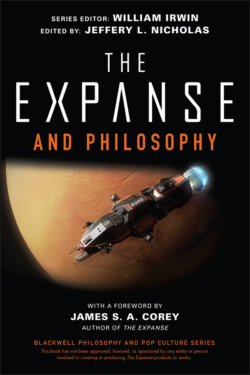Читать книгу The Expanse and Philosophy - Группа авторов - Страница 19
Freedom and the Sublime in The Expanse
ОглавлениеFor some reason, the infinity of The Expanse attracts us. The confrontation with infinity brings us a certain kind of pleasure. We feel awe, wonder. What is it about this experience that draws us to it? The look and design of the show indulges us in an experience of the sublime.
Immanuel Kant (1724–1804) understood the power and importance of this experience. For Kant, the experience of the sublime is the experience of something formless, something without limit. It is the experience of reason’s ability to understand being completely overwhelmed.5 The design of The Expanse returns to chiaroscuro again and again as a way of tapping into this experience for the viewer. The cinematography attempts to take the inconceivable and represent it artistically.
Consider Holden’s conversation on Earth with his mother in “New Terra.” They sit together by a fire. She gifts him a copy of Don Quixote. During the entire scene, the fire lights the faces of both characters. However, the shot is framed so that the darkness behind each of them is prominent. We are left with the understanding that this conversation is unique and individual but situated in infinite space.
A particularly clever example of this technique is the use of the exterior on Ilus/New Terra (I do not want to take sides in that naming debate!). When you watch the characters move across the landscape, notice what the director has done with the sky on Ilus (ok, I took sides). With few exceptions, the sky is an uninterrupted white—a white that is unbroken and infinite. It is a photonegative of chiaroscuro and produces the same effect. We are pointed back to the fact of infinity.
Kant ruminated on the significance of infinity, and the infinite space of the universe, for the meaning of human life. He understood Pascal’s concerns well. Kant took the measure of human beings situated in infinite space and came up with a different account of its meaning. Where Pascal saw insignificance except for our capacity for belief in God, Kant saw a creature that had the capacity to confront the infinite and immeasurable power of nature and, rather than being overwhelmed by it, find in itself something larger, more profoundly powerful and dignified than all of the power of nature combined.
Kant spoke of two kinds of sublime experiences, the mathematically sublime and the dynamically sublime. In each experience, reason is overwhelmed by something so enormous and formless that it cannot be conceptualized. This experience of having our reason overwhelmed throws us into a new understanding of ourselves.
For Kant, the mathematically sublime experience is an experience of reason being overwhelmed in the presence of something infinite in size. You lie on your back looking up at the night sky, seeing the infinite space and uncountable number of stars; the mind spins and cannot grasp what it is experiencing. We feel wonder and awe—that is the mathematically sublime. Taking a spacewalk outside the Rocinante is mathematically sublime. The view of the Behemoth, as its own massive size is dwarfed by the infinity around it, is mathematically sublime. The battlefield of the UN Marines and the MCRN Marines against the first protomolecule hybrids on the surface of Ganymede is mathematically sublime set as it is, without an atmosphere, against an infinite sky. A sublime setting in which to die, but of course, Bobbie Draper refuses to go gently into that good night—you get the idea.
